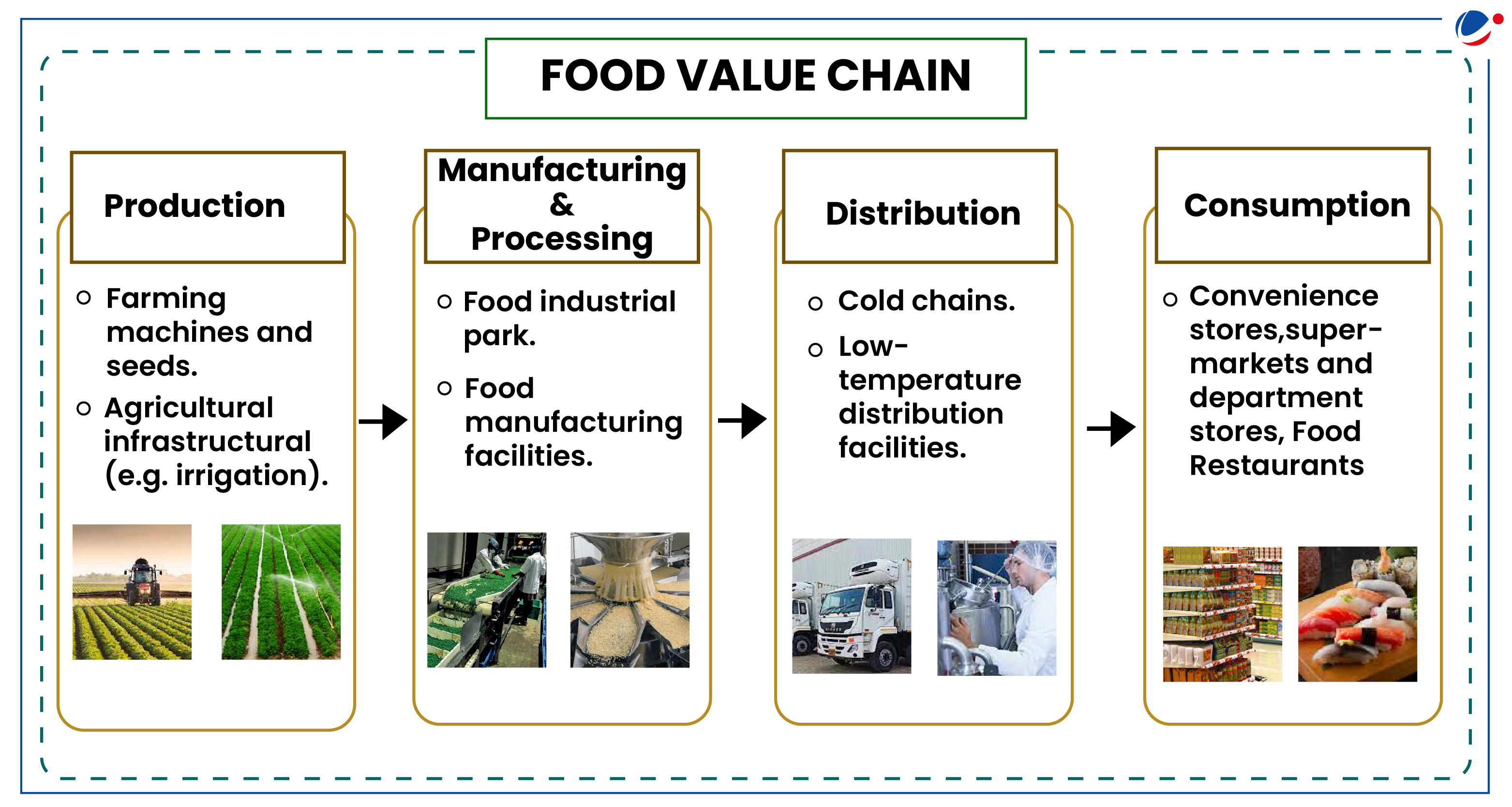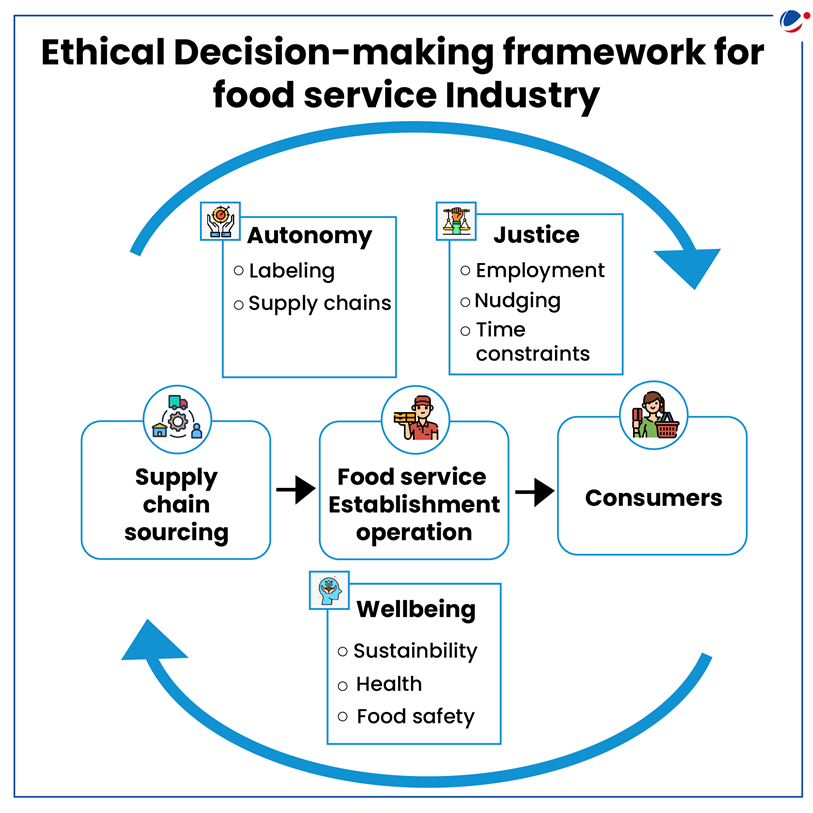Introduction
The presence of carcinogenic pesticide ethylene oxide in several spice mixes of MDH and Everest was detected in Hong Kong, Singapore, and Maldives. Nestlé India was also found to have included sugar in infant milk in India but not in Europe. These instances highlight poor standardization and weakening of Ethics in the Food Industry.
Different stakeholders involved in Food Production and Consumption
Stakeholders | Role/Interests |
|---|---|
Consumers |
|
Companies/Businesses/ Small-scale producers/ Processors |
|
Government/ Regulators |
|
Society/NGOs |
|
International Organisation |
|

What is Food Ethics?
Food ethics concerns the morality of food production and consumption. Food service ethics encompasses moral principles and standards that guide behaviour in the food service industry and across the food value chain.
Key principles of food service ethics
- Justice: From a Social justice point of view, the ethics of food safety involves justice for food providers as well as consumers.
- Justice for Food Providers: Food service workers often face issues like low wages, food insecurity, low standard of living etc.
- Justice for Consumers: From the consumer's perspective Access, Security and Affordability of safe and nutritious food are important issues that are often ignored.
- Autonomy: It means having the freedom to choose how food is produced and distributed (autonomy in Supply Chains), while also respecting consumers' ability to make their own decisions (transparency via Labels).
- Non-maleficence: In the context of food safety, non-maleficence encompasses-
- Taking steps to prevent contamination and foodborne illnesses,
- Avoiding harmful practices, such as using unsafe additives, pesticides,
- Addressing and rectifying safety concerns,
- Being transparent about food sourcing and production methods etc.
- Accountability and Transparency: It involves Responsibility for Food Safety, Addressing Customer Feedback, and Communication with Stakeholders among others.
Regulatory systems for ethics and quality of food products | ||
|---|---|---|
Food Safety and Standards Authority of India (FSSAI) The body is responsible for protecting and promoting public health by regulating and supervising food safety and quality in India. | Codex Alimentarius It is a collection of internationally recognized standards, guidelines and codes of practice for food safety and quality, was developed by Codex Alimentarius Commission (CAC) | State Governments They play an integral role in creation and implementation of regulations on food safety. |
Ethical Dilemmas Involved in Food Service and Safety
- Assigning responsibility for safety: Who should take responsibility to prevent and control foodborne diseases and outbreaks?
- According to WHO, 600 million people fall ill and 420,000 die every year from eating unsafe food.
- Financial Constraints vs. Food Safety: How to balance costs and benefits of food safety measures, especially for small-scale producers and processors and at the same time comply with food safety standards.
- Diverse Individual choices: How to respect the autonomy and preferences of consumers, who may have different tastes or choices.
- Protecting genuine stakeholders: Protecting the privacy and confidentiality of individuals or businesses involved in foodborne incidents, without compromising the public interest or accountability.
- Universal application of safety standards: Another important ethical issue is how to ensure that food services and safety measures are fair and equitable, and not discriminate against certain groups based on socioeconomic status, culture, or geography.

Way forward
- Nudging consumers: Nudges are small changes in the environment of decision or "choice architecture" (e.g. display of choices in a cafeteria, restaurant menu, etc.) to help individuals make choices that are deemed beneficial. E.g. Eat Right India Campaign
- Stakeholder's Capitalism: Stakeholders' perspectives, including those from environmentalists, consumers, and animal industries, are important in ethical decision-making.
- Labelling: Information content and framing on labels need to improve for better communication (E.g. Simple graphical information).
- Also, consumers need to be better informed through education programs on comprehending this information.
- Food safety training and education: Food safety training and education are important for food handlers to prevent food contamination and foodborne disease outbreaks.
- Triple bottom line (TBL) framework: It is a framework for measuring sustainability that considers three dimensions of performance: social, environmental, and financial.
Ensuring ethical standards in food service and safety is paramount for the well-being of consumers, the sustainability of businesses, and the health of our society. By embracing transparency, accountability, and stakeholder engagement, ethical complexities of the food industry can be solved while promoting a healthier and more equitable food system for all.
Check your Ethical Aptitude:A reputed Indian Multinational food and drink processing conglomerate developed an international food product. The company announced that it will soon launch the same product in African market. Accordingly the product got approved by competent authorities and was launched in African Market. However, international investigations later found out that products in African market contained a cancer-causing ingredient, violating the laid down Local food standards. This investigation adversely affected the reputation and profitability of the food company. Also, this isn't first such case, numerous Indian food products have previously been identified with cancer-causing agents in international markets. On the basis of the case study answer the following questions:
|



